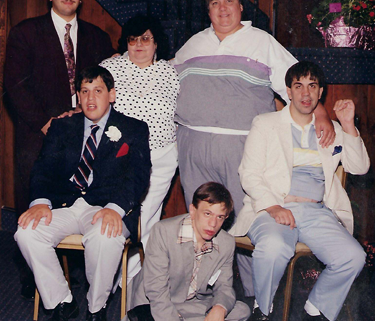Roy’s Fight to Keep His Three Adult Sons at Home and Out of Institutions
As parents of adult children with intellectual and developmental disabilities (IDD) grow older, they may face concerns about what their child’s life will look like when they are no longer able to provide care. Certain questions become important and can be agonizing to think about, such as:
- How will my child’s life change when I’m gone?
- Where will they live?
- Who will pay for the things they need?
For Roy, these questions are all too familiar.

The first time Roy and his wife, Arleen, heard the word autism was in 1963. The high school sweethearts had been married just two years and they were told their son, Roy Jr., who was only a year old, had autism.” After Roy Jr., Arleen and Roy had two more sons, Michael and Glenn, and all three children would eventually be diagnosed with autism and fragile X syndrome.
In those days, institutions were the only options in New York state for people with disabilities. Looking for the best care for their sons, Roy and Arleen visited the Willowbrook State School. The deplorable conditions shook the couple to their core. Roy and Arleen made a vow to each other that day: each of their sons would live at home with their parents all their lives.
The visit to Willowbrook was a turning point in Roy and Arleen’s lives. The family devoted themselves to advocating for their children and others with IDD. Thanks to their advocacy efforts, Roy Jr., Michael, and Glenn attended IDD parent-founded provider agency schools until the Individuals with Disabilities Education Act (IDEA) was enacted in 1976. IDEA guarantees students with disabilities the right to a free and appropriate public education—and after it was passed, the three boys were able to attend public school.
Twelve years ago, Roy’s “dear cherished bride” of 50 years passed away, leaving Roy to care for his three sons alone. After several years of advocacy, Roy received approval from his state agency to convert his home into a certified group home for his three sons and two other men. In 2019, when the family’s in-home residential services were ended by the provider who had served them for 20 years, Roy set up self-directed care for his sons and became an immediate supervisor for a staff of seven.
 Since then, Roy Jr. and Glenn have both passed away. While both lived at home until their passing, they suffered at the hands of an underfunded system of care. Despite these losses and challenges, Roy has remained steadfast in his commitment to keeping his middle son, Michael, in his own home all his life.
Since then, Roy Jr. and Glenn have both passed away. While both lived at home until their passing, they suffered at the hands of an underfunded system of care. Despite these losses and challenges, Roy has remained steadfast in his commitment to keeping his middle son, Michael, in his own home all his life.
Four people have been selected and approved to live with Michael. However, for the past two years, the agency Roy is working with to run the group home has been prevented from opening because they are unable to hire staff at the low salary rate authorized by Medicaid for this type of home. On average, direct care workers get paid just $14 an hour, which is much lower than the hourly rates for similar jobs.
Roy is doing all he can to help plan for Michael’s future. He’s now 84 and Michael will be 60 this summer. Roy wants to ensure Michael is safe at home. For that to happen, Congress must invest in critical supports for people with IDD.
Millions of people with disabilities, like Roy’s son, Michael, rely on Medicaid home and community-based services to live at home in their communities. But due to the fact that Medicaid must fund institutions, and home and community-based services (HCBS) are optional, states don’t have the funding to support everyone in the community.
To change this, Congress must invest in HCBS now!
Roy’s efforts to ensure his son can live at home in his community should not be hindered by decisions in Congress and a lack of investment in disability services.








